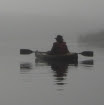Environmentalists have been sounding alarms in global terms since at least the 1960s. One might wonder how such an apocalyptic outcry can be sustained over nearly half a century. Is it only noise? If the dire predictions are true, where are the terrible effects? On the other hand, if this is all false scare-mongering, what keeps the environmentalists going at it?
If you take a more sympathetic view of environmentalism, this half century of alarms still presents a glaring question. If these are truly serious problems, and we know so much about them, why aren't they fixed yet?
I am at heart an environmentalist, having spent my formative years (in the 1970s) immersed in my parents' conservation and outdoor education activities. There was a "Conservation Confab" at Fort San, and I still remember the hilarity - and the sadness - in Bill Mason's "Rise and Fall of the Great Lakes," a film shown to us young folks while the adults did their boring sessions. Mom gave a presentation there about foods gathered from the wild (or something like that), and Dad was probably involved somehow as well. Then there was our family trip down through the western U.S., where Dad visited a series of wind power installations as part of his alternate-energy research for the Faculty of Engineering at the University of Regina. But more important than these occasional exciting ventures was my involvement in the day-to-day activities as my parents helped establish an outdoor education centre (Saskairie), learned to raise cattle, grew large gardens, gathered berries, hunted, canned and dried food, and designed and built a solar-heated and wind-powered home.
I grew up with a deep love of wild places, a simmering resentment against the imposed abstractions of straight roads and square fields, and at the same time, a humble awareness of the sources of my food and shelter. I was never drawn to environmental activism, seeing the problems not so much in industry or government as in individual choices. I preferred to believe that if all were aware, all would do much better.
I sought training in journalism, then changed course to solidify my scientific background in ecology before tackling the enlightenment of the masses. With growing doubts about the power of education to solve environmental problems, I drifted sideways into a geographical study of the way conservation practices spread among farmers. Degree in hand, and bitterly disappointed with my graduate school experience, I settled down to the meagre goal of getting a job that might do a bit of good.
I found work as an environmental consultant, did the best job I could, and waited for the day when my work might make a difference. There was more disappointment ahead.
In recent years, I have given up my idealistic career goals and worked in the environmental field only for the money, or for the sheer joy of being outdoors. Meanwhile, I have turned my quest inward. Reading, debating, and sifting through my own experiences, I have tried to understand what I see as the failure of environmentalism.
In the series of essays to follow, as I examine this failure, I hope to offer some explanation of how it happened, and even some glimpses of why. Ah, hope. There it springs again. I don't know where this writing might lead, what might come out of it, or who might respond with a new vision of a brighter future. I do know that a vision of my own is growing, but before I write about that, I first need to spell out my understanding of the darkness behind.
Table of Essays
These are proposed titles, to pique your interest perhaps, but mostly to jog my memory as I write. They may change. (For example, I may look at a title and fail to remember what it was about). As each essay is completed and posted, I will change its title to a link, so that you can read through the full series in sequence if you wish. Where they appear in this blog, essay titles in this series will be prefaced with the acronym "CTAT," a reference to the series title, "Chained to a Tree."
I'm Not Dead Yet
Walking the Walk
We Can't All Live That Way
Don't Be So Depressing
Every Little Bit . . . Helps?
The Corporate Line
The Government Line
"Sustainable Growth" and Other Mad Buzz
Environmentalism as Religion
Aside: if you're thinking I went straight from global drought to the failure of environmentalism without a pause to give thanks, be assured that I did spend some time this weekend in awe of the glorious gold of autumn aspens. As I said to my family, what kind of universe do we live in, that instead of a relentless slide from warmth and lush green to cold and bleak grey-and-white, we get a riot of red and gold backed by incredible blue? I don't care whether there's anyone to thank. I'll sing my thanks anyway, and whoever wants to hear, let them hear!
why mulch?
2 months ago




